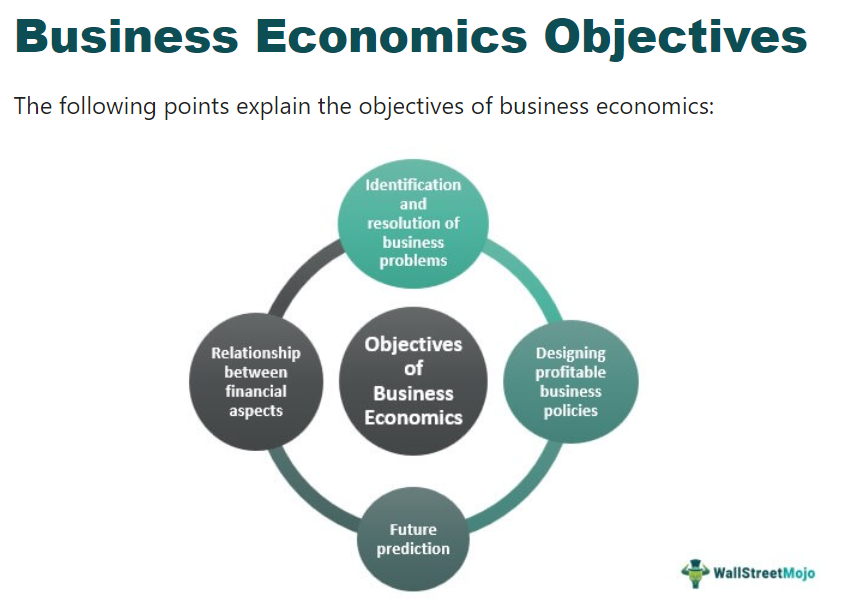The Role of Progress in Business and Economics In Modern Times
The Role of Progress in Business and Economics In Modern Times
Blog Article
Understanding Financial Principles for Better Service Decision-Making
In the facility landscape of modern business, a comprehensive understanding of financial concepts can dramatically enhance decision-making processes. The application of these economic concepts usually reveals unexpected challenges and chances that can redefine strategic strategies.
The Basics of Economic Theory
Financial concept works as the structure for comprehending just how organizations and people make choices in the existence of shortage. At its core, financial theory analyzes the allotment of limited resources to satisfy limitless desires. This basic concept of deficiency necessitates compromises, engaging decision-makers to review the prices and benefits related to different options.
The 2 main branches of financial theory are microeconomics and macroeconomics. Microeconomics concentrates on individual representatives, such as companies and customers, analyzing their actions and communications in details markets. It stresses ideas like supply and demand, price flexibility, and market equilibrium, which are essential for comprehending exactly how prices are identified and exactly how sources are dispersed.
Alternatively, macroeconomics checks out the economy in its entirety, dealing with broader problems such as rising cost of living, joblessness, and financial development. It supplies insights into systemic sensations that impact all economic representatives, assisting policymakers in crafting efficient economic strategies.
Eventually, a solid grounding in financial theory is important for effective organization decision-making. By comprehending the principles of scarcity, compromises, and market characteristics, organizations can better browse complex settings and make notified choices that boost their competitive advantage.
Key Economic Indicators
Secret economic signs work as crucial devices for examining the health and instructions of an economic climate, giving valuable insights for organization decision-making. These signs are measurable actions that show the economic performance and can be categorized into leading, delaying, and coincident indicators.
Leading signs, such as customer self-confidence indexes and securities market patterns, forecast future economic activity, permitting companies to prepare for changes in the marketplace. Delaying indications, like joblessness prices and corporate revenues, offer understandings into the economic climate's previous efficiency, assisting companies to review long-lasting patterns. Coincident indications, such as GDP development and retail sales, rise and fall simultaneously with the economic climate, using a real-time photo of economic problems.
Understanding these signs enables services to make enlightened choices pertaining to investments, resource allowance, and critical planning. A surge in customer self-confidence might trigger companies to enhance production in expectancy of higher need. On the other hand, climbing unemployment prices may cause a reevaluation of growth plans. By very closely keeping track of these essential economic indicators, businesses can navigate uncertainties and position themselves successfully in the ever-changing financial landscape, ultimately enhancing their decision-making procedures and lasting success.

Market Structures and Characteristics
Recognizing market structures and characteristics is crucial for businesses aiming to grow in affordable settings. Market structures, broadly classified right into perfect competitors, monopolistic competitors, oligopoly, and monopoly, significantly influence prices methods, item differentiation, and competitive habits. Each framework offers unique challenges and opportunities that can dictate a company's strategic instructions.
In excellent competition, numerous little firms contend, causing very little rates power and uniform items. Conversely, in monopolistic competition, firms distinguish their products, enabling some level of prices power while still encountering competitors. Oligopolies, characterized by a few leading gamers, bring about synergistic decision-making; companies have to meticulously take into consideration rivals' feedbacks to their actions. Monopolies exist when a single firm controls the market, resulting in maximum rates power yet usually attracting regulative examination.
Recognizing these characteristics allows businesses to prepare for market patterns, adjust methods, and optimize source allotment. In addition, recognizing exactly how external variables like innovation and regulation influence these structures can boost tactical preparation. By grasping market frameworks and dynamics, firms can make enlightened decisions, eventually improving their affordable position and driving sustainable development.
Consumer Actions Insights
Consumer habits plays an essential role fit business methods and outcomes. Comprehending how consumers make acquiring decisions, their choices, and the elements influencing their actions can substantially find out here now boost a company's capacity to meet market needs. Trick insights into consumer behavior can be originated from analyzing demographics, psychographics, and behavior patterns.
Demographic elements such as age, gender, education and learning, and revenue level give a foundational understanding of target markets. Psychographics dig deeper, exploring consumers' attitudes, lifestyles, and values, which can affect brand loyalty and item perception. Behavioral insights, such as purchasing frequency and reaction to promotions, are indispensable for tailoring marketing efforts.
Furthermore, external factors like economic conditions, cultural fads, and technical developments also influence customer choices. During economic slumps, customers might prioritize important goods over deluxe products, altering need go now patterns.
Using Business Economics to Approach
Insights gained from consumer habits contribute in creating efficient company strategies. By leveraging economic concepts, organizations can much better understand market dynamics, optimize source appropriation, and improve competitive placing. Evaluating need flexibility, as an example, enables firms to adjust pricing approaches to optimize income while remaining appealing to consumers.
Furthermore, recognizing market segmentation enables companies to customize their offerings, guaranteeing they meet the details needs and choices of varied consumer teams. Business and Economics. This targeted approach enhances client complete satisfaction and fosters brand name loyalty
:max_bytes(150000):strip_icc()/business-economics.asp-FINAL-625037bc97be4d2291ea40d6d291c9f5.png)
Incorporating game theory into calculated planning also provides understandings right into competitive behavior, permitting firms to anticipate competing actions and develop counter-strategies effectively.

Conclusion
Finally, an extensive understanding of financial principles dramatically enhances service decision-making. By taking a go to this site look at market frameworks, reviewing customer behavior, and analyzing vital financial indications, firms can develop efficient methods that straighten with market demands. The application of concepts such as demand elasticity and chance prices better aids in maximizing resource allowance and financial investment choices. Inevitably, integrating these economic theories promotes enhanced calculated selections, promoting far better expectancy of market fads and competitive actions, consequently driving profitability.
In the facility landscape of contemporary company, an extensive understanding of economic principles can dramatically boost decision-making processes.Leading signs, such as customer confidence indexes and stock market fads, anticipate future economic task, enabling companies to anticipate adjustments in the market. By carefully keeping track of these key financial indicators, businesses can navigate uncertainties and position themselves properly in the ever-changing financial landscape, inevitably enhancing their decision-making processes and lasting success.
By leveraging financial principles, businesses can much better understand market characteristics, enhance source allowance, and enhance affordable positioning.In verdict, an extensive understanding of financial principles dramatically improves business decision-making.
Report this page